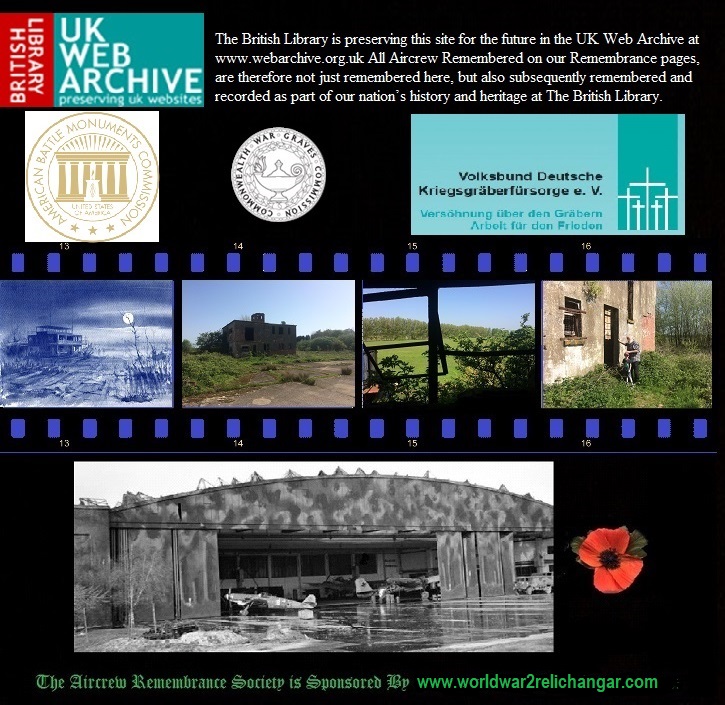Date: 23rd April 1944
Time: 02.00 hrs
Unit: 4 Staffel./Kampfgeschwader 30
Type: Junkers Ju 88A-14
Werke.Nr.144501
Coded: 4D + FM
Location: Manor Farm, Hill Deverill, near Warminster, Wiltshire, England.
Pilot: Unteroffizier. Rudolf Detering. 62748/137 – Captured POW. Born 17.10.1920 in Lübbecke/Westf.
Observer: Unteroffizier. Johann Agten. 62748/138 – Captured POW. Born 27.08.1920 in Gronau/Westf.
Radio/Op: Unteroffizier. Walter Kempter. 62706/4 – Captured POW. Born 12.04.1920 in Nenzing, Krs. Konstanz.
Gunner: Unteroffizier. Helmut Trauwald. 63659/107 – Killed. Born 01.04.1923 in Gr.Rudminnen.
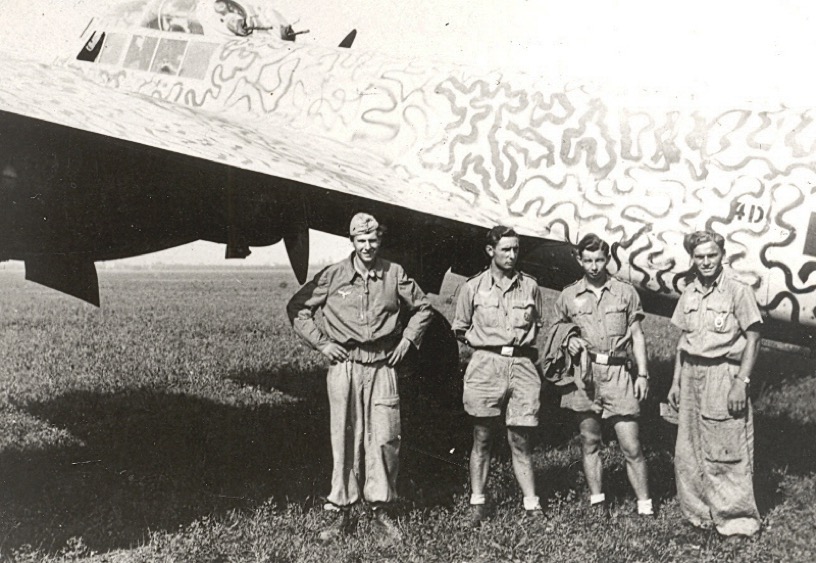
Uffz. Detering, Uffz. Trauwald, Uffz. Agten and Uffz. Ruell (Uffz Kempter's predecessor)
REASON FOR LOSS:
On the morning of April 23rd 1944, Luftwaffe bomber crews of the Stabs Schwarm and three Staffeln of II and III Gruppe KG30 flew from their base at Bad Zwischenahn to the French airfield of Paris/Orly. Immediatly after landing, the mechanics and ground crews were preparing to re-fuel and re-arm the Junkers Ju 88’s in preparation for the coming night’s mission to England.
At approximately 16.30 hrs that Sunday afternoon, the Gruppenkommandeur of the II Gruppe, Major Pflueger, briefed the assembled young aircrews in detail. Their target was merely described as "The City of Bristol", the area to be attacked would be marked by a square of red & white flares, dropped by Pathfinder aircraft. The route laid down for the II Gruppe was to fly from Paris/Orly to Guernsey, which was the rendezvous and first turning point, then to the second turning point which was the mouth of the River Usk. The bombing run was to be made in a north - south direction, bombs to be dropped at a height of 16,000 feet, then after the attack all to return to Orly. The bomb loads that the ground crews were preparing for the raid are as follows; 2 AB 500 incendiary containers, one filled with ordinary 1-kilo I.B's having explosive noses (IBEN), with a further ten 50-kilo phosphorus incendiary bombs. One particular crew at the briefing listened intently to their Gruppenkommandeur, they had already flown over 20 missions and all wore the Iron Cross 1st Class and the 20 mission bronze war flights badge. These four young men had a close bond together, but little did they know that one of them lose their life during this coming night’s operation.
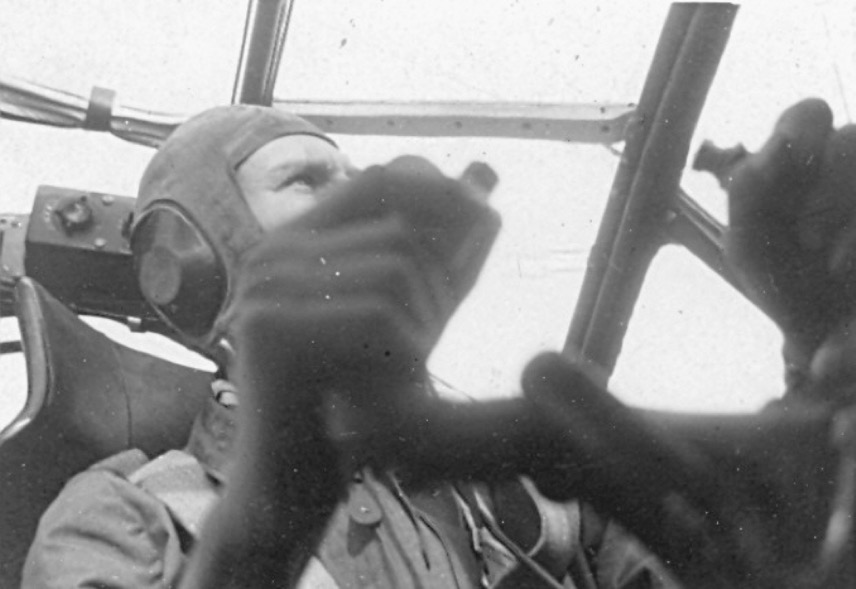
The pilot aged 23, was Uffz. Rudolf Detering, his observer was also aged 23 Uffz. Johann Agten.
The radio operator was 23 year old Uffz. Walter Kempter and lastly the gunner, Uffz. Helmut Trauwald, the youngest aged 21.
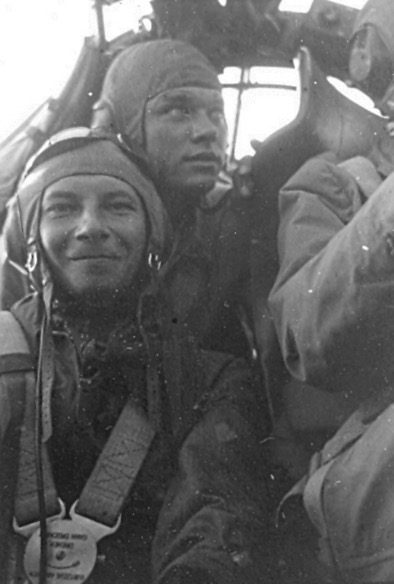 cc
cc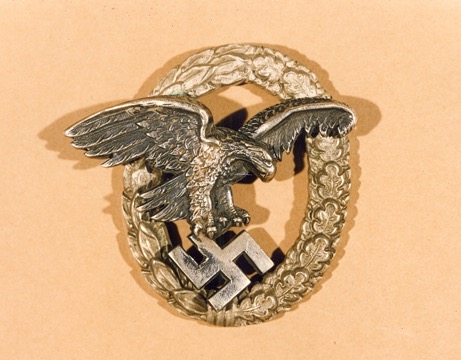
Antenna & Helmut Trauwald (Kempter) Johann Agten’s Observer’ badge (King).
Their aircraft for this mission was the 4D + FM, a Junkers Ju 88A-14, Wnr.144501. At 23.50 to 00.10 hours some 15 to 20 aircraft of II/KG30 took off from Orly between one and two minute intervals, the 4D + FM was the 7th in the group airborne.
Uffz. Detering headed on the prescribed course, flying at first at a height of between 400 - 800 metres to a point in the Caen area. From here their Ju 88 gradually gained height. Guernsey was reached at 01.15 hours, by the time they had reached landfall at a point near Weymouth, they had attained an altitude of 6,000 metres. The remainder of the crew settled in their relevant positions and focused their eyes to the night skies in search for the RAF night fighters. At no time did they see any other aircraft from the Gruppe, they were alone!
At 01.10 hours (BST) on the 24th April, a Mosquito XVII/A1, coded with the letter T for Tommy of No.125 Newfoundland Squadron prepared to take off for a night interception sortie from RAF Hurn. GCI Sopley had a fix on an incoming enemy aircraft heading on a course to the west of England. The enthusiastic aircrew scrambled to their aircraft, in this case this was a very experienced crew, S/L Eric Barwell DFC, a veteran since 1940 with five enemy aircraft destroyed and his trusty navigator F/L David Haigh. They were ordered to orbit R sector where many searchlights were seen in the distance along the south coast, towards the west country. The lights from searchlights were seen through the low stratus cloud, they flew on towards their incoming target. Meanwhile, Uffz. Detering and his crew have passed the south coast, radio operator Uffz Walter Kempter takes up the story…….
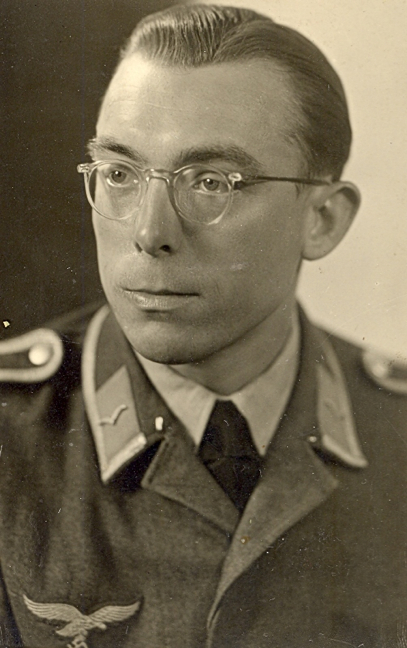 cc
cc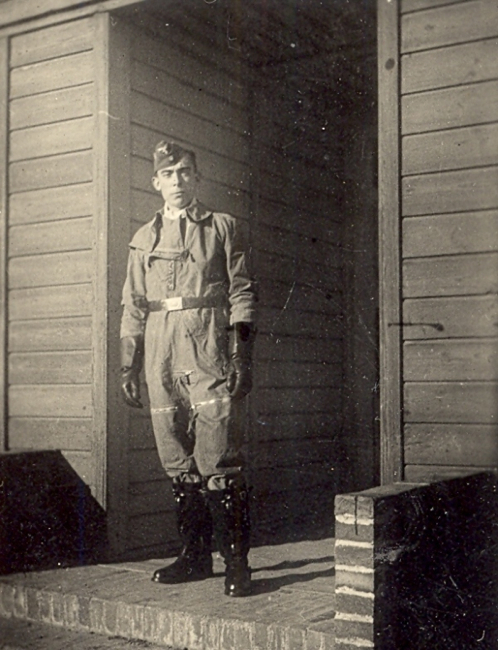
Uffz, Walter Kempter (Kempter/Brownless) Walter pictured in flight gear.
At the south coast of England we anticipated heavy AA fire, but it was strangely quite, we of course expected the RAF night fighters. I was on alert, yet I did not see any, neither did my three comrades. We lost some height to about 4,000 metres and started to bundle out packets of silver foil strips of Duppel in case we have been picked up by British radar. Suddenly and unexpectedly I felt a heavy strike against our machine, then a searing mass of flames. We had been hit by a night fighter! In such a terrifiying situation there is, as you probably can imagine, no time for talking. Without hesitation I un-locked the emergency exit and immediatly baled out, having no concern of still being connected to the wireless set and oxygen equipment. Once clear of the aircraft I counted 21 - 30 seconds before I opened my parachute. I had to be clear of the burning plane. In which order we all left the aircraft I do not know, but regulations state that in an emergency situation, I, the radio operator releases the rear part of the canopy and jump, followed by the navigator, pilot and gunner.
I remember experiencing a feeling of calm as I floated in the air, it was somehow wonderful. Above me the night sky, beneath me Great Britain wrapped in total darkness. A new chapter in my life will now begin, an uncertain future lay before me and I was inclined to pray. I looked above for my parachute, interrupting my thoughts and bringing me back to reality. My parachute was partially damaged, torn in two places. I immediatly became terribly frightened, but thankfully the chute did not tear anymore. I hoped soon to land on "mother earth". I could not perceive the distance to the ground as there was some mist which I guessed were about 2 - 300 metres above ground. As I floated into the mist I withdrew my signal pistol and fired one shot towards the ground so as to try and prepare my landing. As I fired I was instantly aware of the rebounding fireball, it was the ground and I am suddenly on British soil. I was unhurt except for a slight sprain to my left foot. My thoughts returned of my comrades, did they get out in time or have they perished!
CAPTIVITY
When my eyes had finally adapted to the darkness surrounding me, I saw nearby a dark silhouette which I believed to be an outline of a house. I approached with caution until I realised that it was infact not a house but a stack of straw. I wondered if these stacks were a feature of this region. That night I spent in the stack, I could not sleep and nobody thankfully found me. It was about 5.00 a.m that I decided to set off not knowing which direction to take. The landscape was very hilly and divided by fences. Knowing that there was no way home I thought of what I should do. My main problem was how to become a prisoner without any danger of reprisals from the local people. I decided to find the nearest village and give myself up to the local police. Before I leave I hide all my personal belongings in the stack, my parachute and a large amount of French money, which I planned to spend in Paris after our return from the raid. I hoped that maybe I could find some of my comrades or even our plane, but this was not to be.
From time to time I took out my English pocket dictionary and learnt my first few words of essential English. At about 12 noon I finally came across a village. I carefully approached the first house and knocked on the door, someone answered, "come in", I then opened the door into the kitchen where an elderly lady stood washing in a bowl, she was alone and showed no fear when confronted by a German airman. In my broken English I asked her for a telephone, but I could not understand her reply, again I stammered "have you a telephone, police, police". This she must have understood and took me outside and pointed to a house across the road. I crossed the road and entered the half opened door, there was a telephone, I hesitated momentarily, then I felt someone’s hand on my shoulder. It was an elderly man, he must have seen me going into the house and became suspicious and followed me in. As we faced each other I said, I am German, he then gestured me to wait while he made a telephone call, his eyes never left me for a minute. He then took me outside and we walked to the policeman’s house but he was not there so we waited. Nearby to us there were four or five women, they showed me no hostility, on the contrary, when I made a gesture for a drink each one of these kind women gave me a glass of water which I appreciated very much.
Half an hour passed then a car arrived, a policeman and a civilian got out and approached me, the latter addressed me in perfect German. I told him my story but had expected to be overpowered by force because I still had my pistol with me. However, when I attempted to climb into the car, the policeman threw his arm around my neck and disarmed me. I made no resistance only resignation. I held up my hands and said; "Ich bin Ihr gefangener" (I am your prisoner).
The two men took me by car to Warminster, where they delivered their prisoner to the police station. A short while after a civilian entered the room and spoke to me in perfect German. He asked me many questions and asked me if I was injured, I replied I am well except for slight pains in my left foot, which he in turn answered; then you can consider yourself more lucky than your comrades! I asked him what he knew of my friends? He said that they had found our gunner Helmut dead with bullet wounds attributed to the night fighter attack. The other two had broken bones and that our observer will probably never be able to walk again. Was this true, I did not know. After my first interrogation at the police station I was given a hot cup of coffee and some cake. I was then taken to my cell where I could get some sleep. Later three soldiers arrived at my door armed to the teeth and escorted me to the train station by jeep. Around midnight we reached a station in London, then began eight weeks of interrogation, not very agreeable, but that’s another story............
The remains of Uffz. Kempter's aircraft broke up in the air over Manor Farm, Hill Deverill, a small village south of Warminster, Wiltshire. The wreck of the Ju 88 was completely burnt out after exploding in the air close to Manor Farm. Firefighters from the Warminster NFS did an excellent job in quelling a serious outbreak of fire caused by falling phospherous bombs on a farm occupied by Captain Booth. Manor Farm had a miraculous escape, the plane passing low overhead and crashing in fields adjacent to the farm. A 70 ton straw rick was completely gutted having been destroyed in less than half an hour. The remains of the Ju 88 was a burning furnace but the NFS controlled this by means of using a mobile dam using foam. It was indeed fortunate that the village was spared the horror of complete destruction which might easily have happened had the plane fell in the midst of the houses. A warning was issued not to tamper with the bombs or any other object found on the ground after the crash.
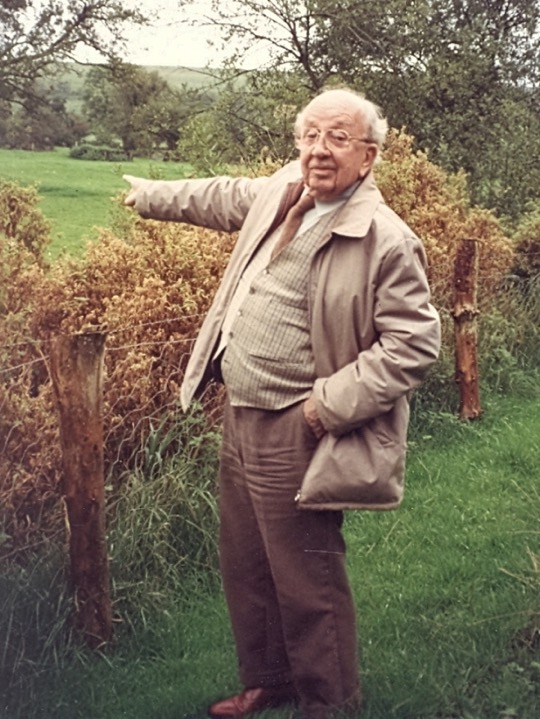
Former NFS Fireman John House points to where he found the body of Helmut Trauwald.
In the light of day on the 24th, Fireman John House found the body of young Helmut Trauwald near to the wreckage.
As for the remaining crew members, the pilot, Uffz Detering gave himself up to Major Fane when he awoke the household at 3.00 a.m in the morning. He was bleeding profusely from his wounds, plus he was nursing a broken arm. Three miles away, the observer Uffz Agten surrendered to Home Guardsman Mr Philip Burt. Mr Burt found the wounded airmen lying beside his parachute after being alerted by the barking of a dog. The two airmen were admitted to hospital for the treatment of injuries sustained. Eventually they followed the same path of interrogations that Uffz Kempter took.
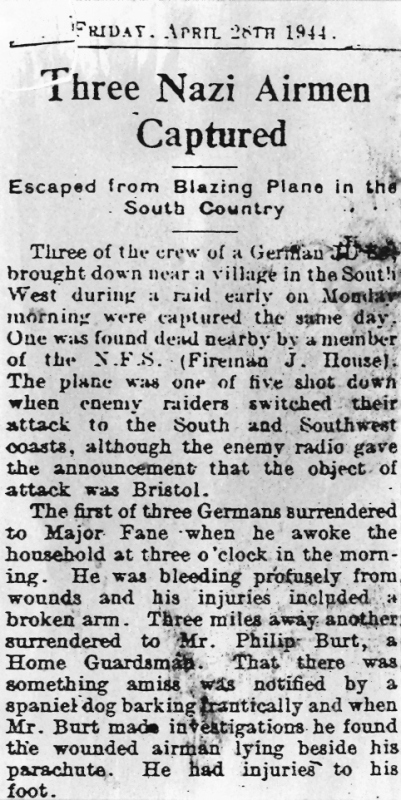 cc
cc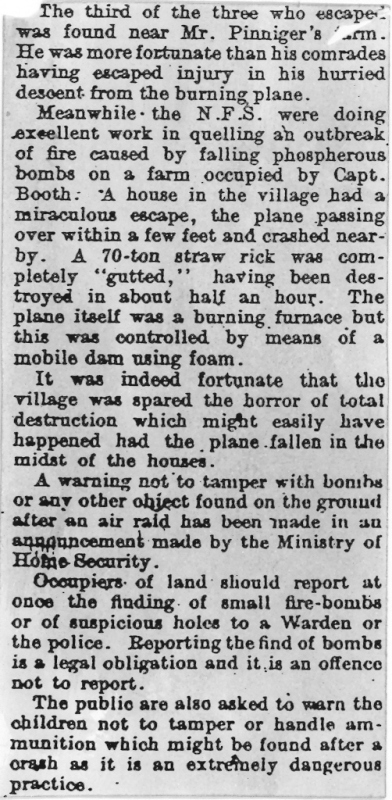
Warminster Journal newspaper cutting regarding the crash and capture of three German airmen.
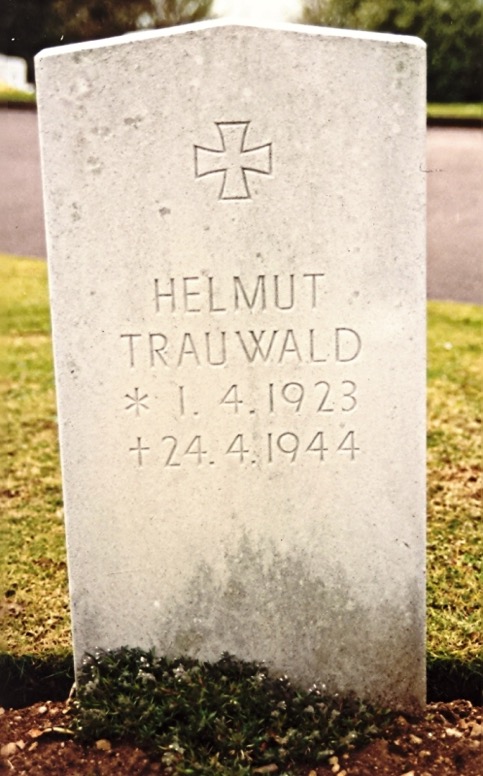
Burial detail: Helmut Trauwald now lies in the Haycombe Cemetery, Bath.
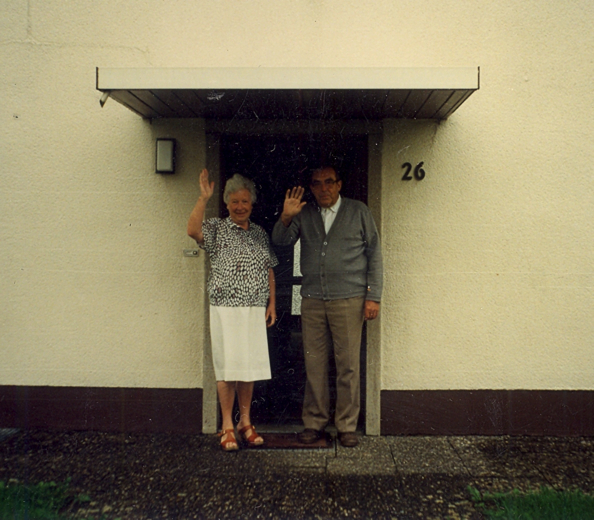
Lore & Walter Kempter bid us farewell on our return to England (Brownless)
In 1992 Mike Croft and Melvin Brownless flew to Stuttgart and then drove to Stockach to meet with Walter Kempter at his home. This for us was our first trip to Germany and the very first time on the Autobahn! We were really impressed with German driving skills, especially as most Autobahn’s are only two laned each side. Drivers who were in the outside lane automatically pulled into the nearside lane when a faster car was approaching from behind, we thought, “This would not happen in England”.
We arrived safely at Walter’s house in the early afternoon, had a quick coffee and then we were out on a tour of the wonderful town of Stockach, which is next to Lake Constance, a truly beautiful area. After a lot of walking we returned home for dinner. Walter and his wife Lore were truly great hosts, they kindly put us up for a few days, fed us and were thoroughly charming. Unfortunately Walter passed away a number of years ago and this page of remembrance is dedicated to him and his fellow comrades, RIP.
Researched and compiled by Melvin Brownless & Mike Croft (1992) With special thanks to Walter & Lore Kempter.
